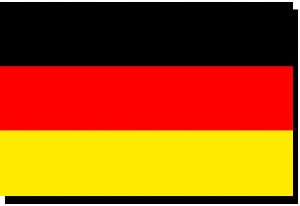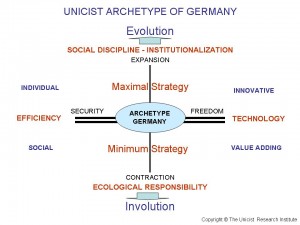 Germany is a model of efficiency in the development of all its economic, social and “ecological” activities.
Germany is a model of efficiency in the development of all its economic, social and “ecological” activities.
We strongly recommend watching the following videos:
http://www.youtube.com/watch?v=3aDJpE_GAgA
http://www.youtube.com/watch?v=npNnme68nKI
The German model is a unique model that many admire and that few can follow since in fact, other cultures find it difficult to keep up not only with its social discipline but also with its social and “ecological” responsibility.
All this efficiency, however, bears a price that the German culture pays for in each cycle. The efficiency and discipline, basis for any institution and for collective operation, naturally produces creativity crises.
As far as social evolution goes, Germany appears clearly oriented toward expansion, which says much of the strength of its society’s institutional values. The social values appear to be today, and relatively speaking, “always” were, very strong and very national.
A member of the German culture belongs to it whether in his own country or elsewhere in the world. The individual values in Germany are much geared toward giving precedence to the group rather than to the individual.
 Germany is an influential culture
Germany is an influential culture
Influential cultures are naturally expansive and oriented toward the global world. That is why they develop powerful technologies to influence the world based on a superior capacity of work. This is the case of Germany that is based on the integration of the need to grow, its institutionalization and its ecological responsibility.
Its ecological responsibility includes both the environmental responsibility and the responsibility of ensuring a “vital space” for the coming generations.
Germany’s maximal strategies
The maximal strategies for the expansion of the German culture are driven by its social discipline, are based on its innovative technology and are sustained by the individual efficiency. Social discipline works as a driver for work but also inhibits innovations that might endanger the consistency of the social structure.
 Maximal strategies allow expanding in the world based on a superior technological approach that opens the markets and differentiates its products. German archetypical expansion is based on the capacity to produce institutional responses to the problems organizing an institutionalized innovation sustained by individual efficiency.
Maximal strategies allow expanding in the world based on a superior technological approach that opens the markets and differentiates its products. German archetypical expansion is based on the capacity to produce institutional responses to the problems organizing an institutionalized innovation sustained by individual efficiency.
This model generates naturally a structural approach that lowers the speed in the short run and is faster in the long run.
Germany doesn’t base its influence on exporting culture nor its way of life. It is based on exporting more efficient solutions for existing problems.
Germany’s minimum strategies
The minimum strategies are based on exerting the ecological responsibility in the social and environmental field to ensure the vital space for the coming generations. To do so its natural trend is to add value and its social efficiency is based on the discipline the culture has.
The value of work sustains its minimum strategy which makes the culture very powerful, considering that the value of work is what sustains the power of Nations.
To apprehend the German archetype it is necessary to share the value of “Work”. Germany is a unique example of “Work” in the Western World. This work is based on its fundamentals that define its archetype.
Access the unicist standard contained in the Unicist Business Search Engine: http://www.unicist.com/
Request more information: n.i.brown@unicist.org
Peter Belohlavek
NOTE: The Unicist Research Institute is the major research organization in the world in its specialty based on more than 3,000 researches in complexity science applied to individual, institutional and social evolution. The applicative researches are based on the discovery of the Ontogenetic Intelligence of Nature and the consequent Unicist Theory of Evolution.
If you would like to receive monthly information on this blog, please register here.
